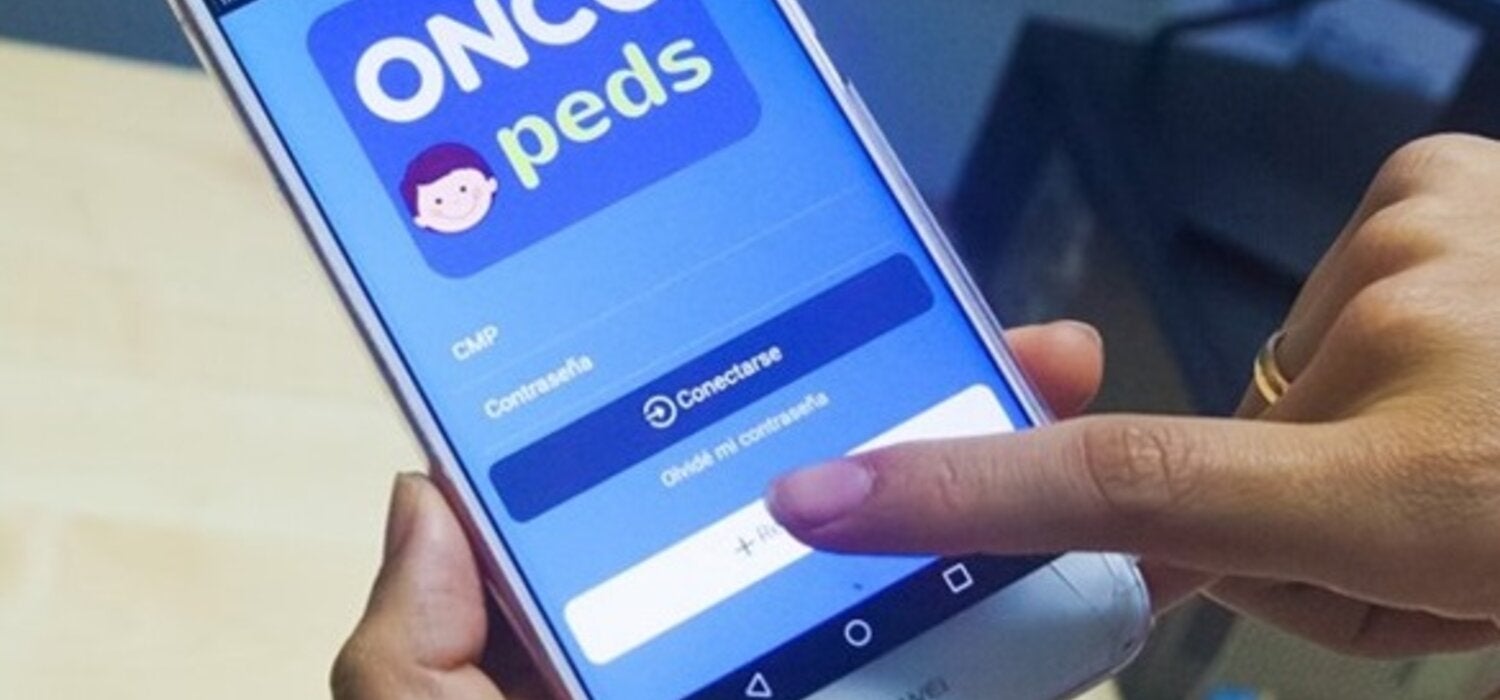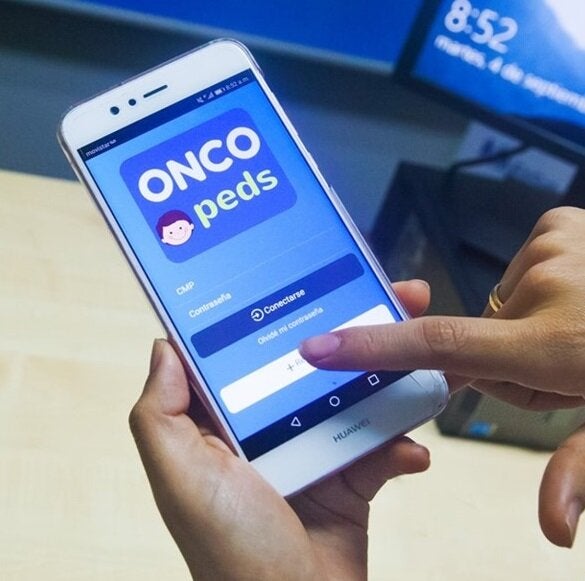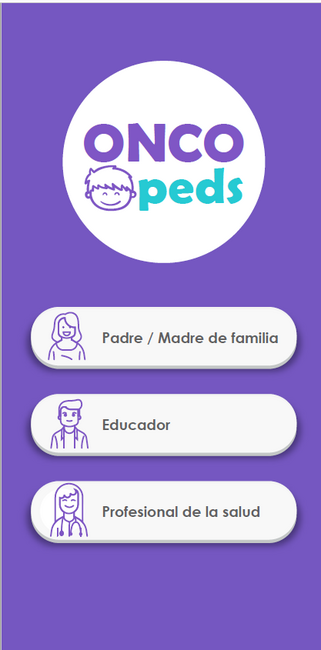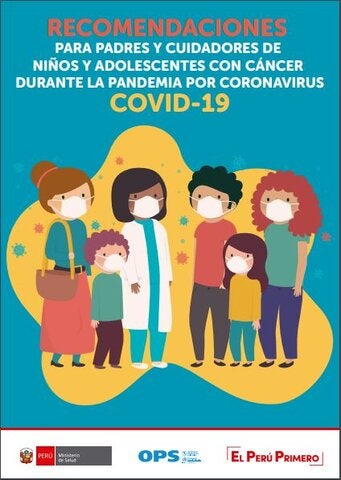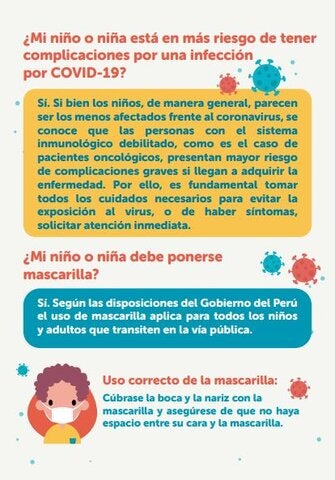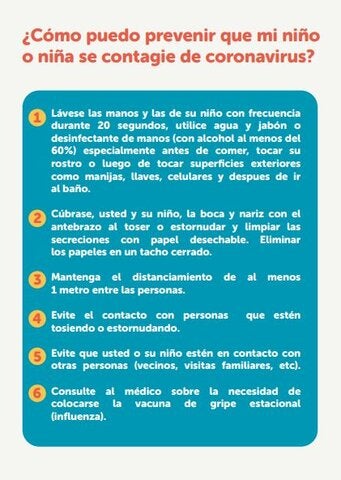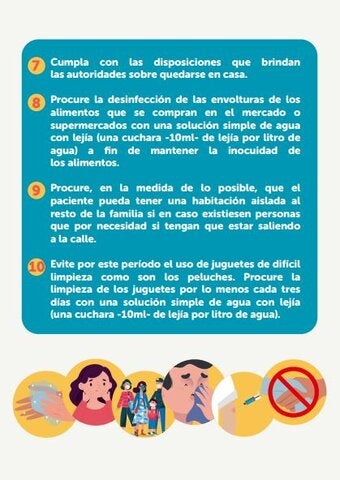An application designed to improve early diagnosis of childhood cancer expands its role to allow communication within pediatric oncologists, parents, and doctors at the primary care level during the pandemic.
Washington, D.C., 10 August 2020 (PAHO/WHO)—One of the cruelest effects of COVID-19 pandemic is the separation of families. For this reason, when the outbreak began in Peru, some provincial patients in the palliative care stage had to stay home with their families. However, contact and follow-up of these patients were not interrupted despite the distance.
An app originally designed to promote early diagnosis of childhood cancer helped specialists stay in touch with parents and primary care physicians who continued caring for them. ONCOPEDS became the key tool to keep the care and follow-up of children with cancer beyond the hospital walls.
ONCOPEDS is a smartphone application (Android or IOS) that allows the exchange of images and data between general practitioners and primary care pediatricians with pediatric oncologists. It was created in 2017 by the Association of Pediatric Hemato-Oncology of Peru (HOPPE, for their abbreviations in Spanish) to promote the early detection of childhood cancer. Its development had the support of the Ministry of Health and financing from external partners and is part of the work carried out within the framework of the WHO Global Initiative for Childhood Cancer, in which Peru is one of the countries implementing the initiative in the Region of the Americas.
Before the pandemic, ONCOPEDS was used to carry out inter-consultations between primary care professionals and specialists regarding suspected cases of cancer and facilitate the transfer to Lima of patients to make the diagnosis and continue treatment.
Through ONCOPEDS, doctors have been able to consult with us on how to manage pain, oxygen, monitor them properly, and the general care that they should have at these moments of the end of life, to make such a complicated situation less painful," explains Dr. Jacqueline Montoya, a pediatric oncologist at the National Institute of Neoplastic Diseases and leader of the team to strengthen the early diagnosis of childhood cancer in Peru.
ONCOPEDS uses expanded
COVID-19 disrupted the routine of oncological treatments: although hospitalized patients continued to receive care and treatment, teleconsultations with those not admitted had to be initiated to reduce the risk of infection; Outpatient consultations and procedures were suspended for a few weeks, and transfers between hospitals were restricted due to restrictions on mobility and the risk of contagion.
"We count on a platform that facilitates communication between the primary care physician and specialists in Lima and can obtain a response in real-time. Now we have expanded it to parents and teachers and non-medical staff," explains Dr. Montoya.
"Through ONCOPEDS, we receive consultations from patients who have cancer and are under treatment but cannot reach Lima. This way, we can guide them in terms of their treatment, prevention measures, and if they have any problems, help them receive some type of support and help in the hospitals in their place of origin."
In addition to monitoring patients in palliative care, ONCOPEDS is serving to monitor cancer patients who are still on outpatient treatment or who need to be hospitalized in their places of origin, supporting doctors and parents. "We have expanded it so that doctors and patients can have more support during this situation."
Dr. Montoya added that it has also been used for its original function: to help promote early diagnosis by guiding general practitioners and pediatricians at the first level and advising transfer to a second level when the case warrants. "Although there is a little more delay due to the difficulties of mobilizing the provinces to Lima," she acknowledges.
And although face-to-face training plans had to be postponed for the time being, with PAHO support, educational material has been developed to help patients and their families detect the symptoms and signs of their disease and those that they may experience if they develop COVID-19.
PAHO's educational materials have helped patients understand the COVID-19 situation and know how to protect themselves," explains Dr. Liliana Vásquez, PAHO/WHO national consultant in Peru for the pediatric cancer project.
Hospital care
In some hospitals in Peru, including the National Institute of Neoplastic Diseases, outpatient chemotherapy, and consultation services, were altered and even temporarily suspended due to increased transmission of the new Coronavirus. The transfer to the hospital posed a higher risk to the patients.
For them, the application and coordination with primary care doctors served to continue the follow-up, "so that they do not feel abandoned in their treatment, but on the contrary, they feel that all this continues and that, not for the infection, the issue of their underlying disease gets left aside," says Dr. Montoya.
Hospital care was maintained at all times, providing the necessary treatment and reinforcing physical distancing and protection measures within the same institution to avoid virus transmission. Both patients and their accompanying relatives undergo COVID-19 tests.
Children are amazing; many times, they assume the situation better than adults and their parents. They know about the Coronavirus and that they have to take care of themselves and not play with other children. They take it as something else that is happening to them”.
On the other hand, for parents, there is a significant concern: for those hospitalized, "they are very concerned about the issue of contacts, so we have informed them of how things will get handled," she explains. For those who are at home, ONCOPEDS has been a tool to ask their questions and queries to specialists.
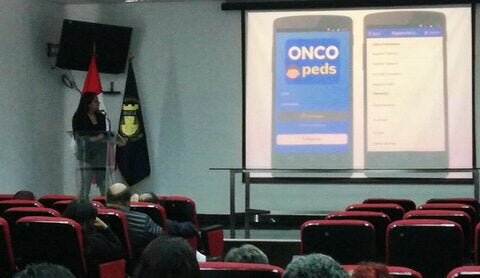
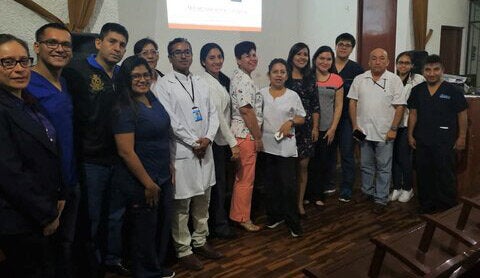
COVID-19 Lessons
Health personnel is also subjected to situations that cause severe stress as they work in situations that expose them to the virus. "It is what we have chosen, and we must do, but we are also concerned about infecting the family," acknowledges Dr. Montoya.
"We have formed a fairly united group, that we share experiences, many of us are friends, and it helps us in the containment of this situation that is being quite complex for all of us."
For Dr. Liliana Vásquez, COVID-19 does a before and after. "Many of the activities have been reinvented or improved and adapted. Telemedicine is a fundamental tool to work and get ahead, and in childhood cancer, it has been improved and adapted to the situation we are living in. "The example is the use of ONCOPEDS, which, although it does not replace the telemedicine service of a hospital, helps to complement it and can be an example for other countries, where the use of telemedicine in oncology services is still limited.
"ONCOPEDS is an application that gives an example of how the effects can be mitigated when patients cannot go to a consultation, or when parents cannot pay for a particular consultation, but through such a simple element, people can approach. And the most important thing is that it is working," she assures.
Looking to the future, the purpose of both is to maintain the unity of the group and achieve the final objective: that pediatric cancer patients have better survival and lower the mortality rate, through early diagnosis.
Related links (in Spanish)
VIDEO

